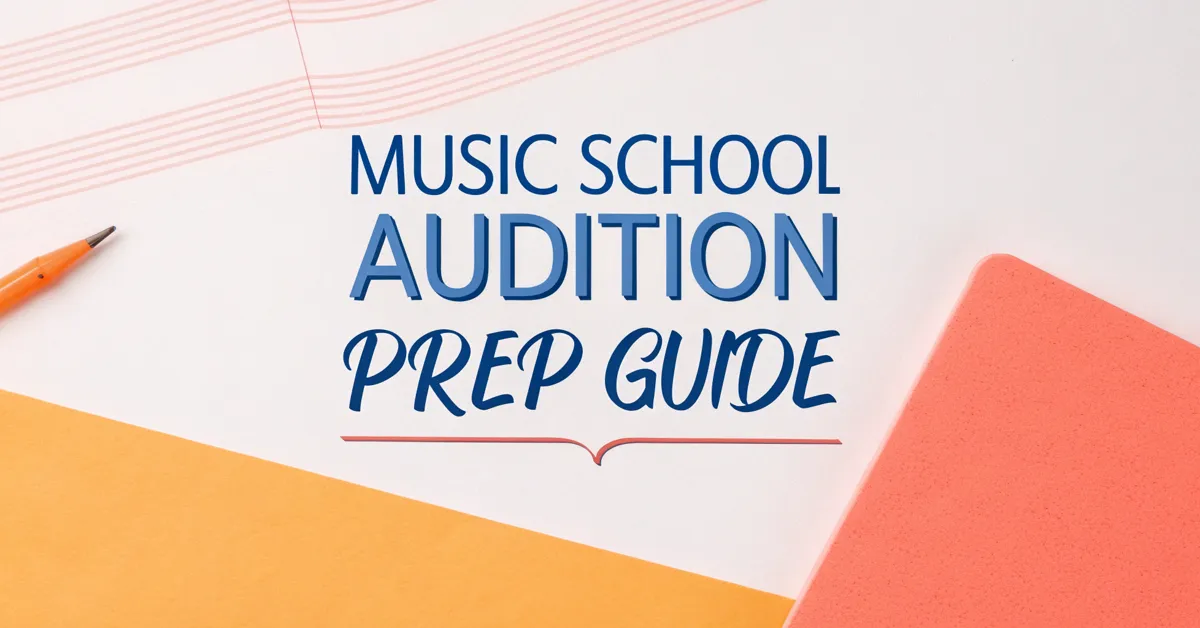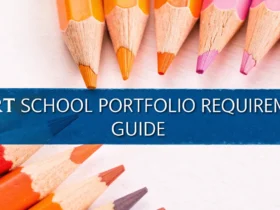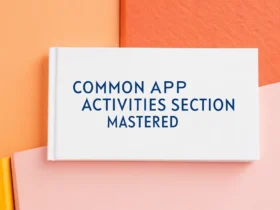Applying to music school is a big deal. You have poured countless hours perfecting your craft, and now you’re ready to showcase your talent. But a great performance alone isn’t always enough; nailing a music audition requires careful prep, both musically and mentally.
This guide serves as a beacon, illuminating the path to a successful music audition. Within these digital pages, you’ll uncover strategies designed to equip you with the tools, knowledge, and confidence needed to shine when it matters most. From selecting repertoire to mastering performance anxiety, we’ll explore what it takes to impress audition panels and secure your place at the conservatory of your dreams.
So, let’s embark on this journey together, transforming audition anxieties into opportunities for artistic triumph.
Music School Audition Prep: Your Comprehensive Guide
The world of music is competitive. Gaining entry to a top music school means demonstrating exceptional talent, dedication, and preparation. A successful music audition requires careful planning and execution. This guide will walk you through the essential steps to prepare for your music audition and present your best self.
Understanding the Music Audition Process
Before diving into specific preparation techniques, it’s crucial to understand the general structure of a music audition. While the details may vary between institutions, there are common elements you can expect.
Researching Specific Requirements
Each music school will have its own specific audition requirements. These may include:
- Repertoire: Required pieces, often with specific movements or sections.
- Scales and Arpeggios: Tests of technical proficiency in various keys and patterns.
- Sight-Reading: The ability to perform an unfamiliar piece of music on the spot.
- Ear Training: Tests of your ability to recognize intervals, chords, and melodies.
- Interview: A chance for the faculty to get to know you and your musical goals.
Carefully review the audition requirements for each school you’re applying to. Pay close attention to deadlines, specific editions of music, and any other unique instructions. For example, some schools may require video pre-screenings before inviting you to a live audition. Missing a seemingly small detail can unfortunately impact your application.
Typical Components of a Music Audition
While specific requirements differ, expect these common audition elements:
- Prepared Pieces: The cornerstone of your audition. These should demonstrate your technical skill, musicality, and artistic expression.
- Technical Exercises: Scales, arpeggios, and other exercises showcase your fundamental technique.
- Sight-Reading: Assesses your ability to quickly learn and perform unfamiliar music, testing your musical intuition and adaptability.
- Ear Training: Evaluating your aural skills, encompassing interval recognition, chord identification, and melodic dictation.
- The Interview: Faculty seek to understand your passion, aspirations, and suitability for their program.
The Importance of First Impressions
Audition panels often form initial impressions within the first few seconds of your performance. This underlines the weight of preparation, presentation, and demeanor from the outset. Project confidence, make eye contact, and introduce yourself clearly.
Choosing Your Audition Repertoire
Selecting the right repertoire is a critical decision that can significantly influence your audition’s success. Your pieces should showcase your strengths, highlight your musical personality, and meet the specific requirements of each school.
Selecting Pieces That Showcase Your Strengths
Choose pieces that you perform exceptionally well and enjoy playing. Highlight your technical skills, musicality, and expressive range. Avoid pieces that expose your weaknesses or that you find uninspiring. For example, if you have a powerful tone but struggle with fast passages, select repertoire that emphasizes your tone quality over technical virtuosity.
Meeting the Specific Requirements of Each School
Carefully review each school’s required repertoire list. Adhere to the specified pieces, movements, and editions. If given a choice, select pieces that align with your strengths and demonstrate your understanding of the school’s musical focus.
Demonstrating Musical Diversity
Select pieces from different periods, styles, and composers to display your versatility. A well-rounded repertoire demonstrates your breadth of musical knowledge and adaptability.
For example, a pianist might choose a Bach prelude and fugue, a Beethoven sonata movement, a Chopin nocturne, and a Debussy prelude. This shows proficiency in Baroque, Classical, Romantic, and Impressionistic styles.
Considering the Overall Length of Your Audition
Be mindful of the allotted audition time and choose pieces that fit within the timeframe. It’s better to perform shorter excerpts flawlessly than to rush through longer pieces and make mistakes.
Mastering Your Performance
Once you’ve chosen your repertoire, the real work begins: mastering your performance. This involves dedicated practice, attention to detail, and developing strategies for handling performance anxiety.
Effective Practice Techniques
- Deliberate Practice: Focus on specific areas for improvement. Break down challenging passages into smaller sections and practice them slowly and repeatedly until they are smooth and accurate.
- Slow Practice: Slow practice is the key to mastering difficult passages. It allows you to focus on accuracy, intonation, and musicality without the pressure of speed.
- Metronome Practice: Use a metronome to develop a steady sense of rhythm and timing. This helps you maintain a consistent tempo and avoid rushing or dragging.
- Record Yourself: Recording your practice sessions allows you to objectively assess your playing and identify areas for improvement.
- Mock Auditions: Simulate the audition experience by performing your repertoire for friends, teachers, or colleagues. This helps you build confidence and get used to performing under pressure.
Memorization Strategies
Memorizing your audition pieces is generally expected, although some schools may allow you to perform with the music. If memorizing, use these proven strategies:
- Analytical Memorization: Understand the underlying structure of the music, including the harmony, melody, and form.
- Aural Memorization: Internalize the sound of the music and be able to sing or hum the melody from memory.
- Visual Memorization: Visualize the score in your mind and be able to “see” the notes on the page.
- Kinesthetic Memorization: Develop a physical memory of the movements involved in playing the piece, such as finger patterns and bow strokes.
Developing a Compelling Stage Presence
Your stage presence is just as important as your musical ability. Project confidence, make eye contact, and communicate your passion for the music.
- Posture: Maintain good posture and avoid slouching or fidgeting.
- Eye Contact: Make eye contact with the audition panel to connect with them and convey your sincerity.
- Facial Expressions: Use facial expressions to communicate the emotions of the music.
- Body Language: Use your body language to enhance your performance and engage the audience.
Overcoming Performance Anxiety
Performance anxiety is a common challenge for musicians. Here are some strategies for managing anxiety and performing your best under pressure:
- Preparation: Thorough preparation is the best way to reduce anxiety. The more confident you are in your playing, the less anxious you will feel.
- Visualization: Visualize yourself performing successfully in the audition. Imagine the positive feelings of confidence and accomplishment.
- Deep Breathing: Practice deep breathing exercises to calm your nerves and reduce tension. Inhale slowly and deeply through your nose, hold for a few seconds, and exhale slowly through your mouth.
- Positive Self-Talk: Replace negative thoughts with positive affirmations. Tell yourself that you are prepared, capable, and deserving of success.
- Mindfulness: Focus on the present moment and avoid dwelling on the past or worrying about the future.
Pre-Performance Rituals
Develop pre-performance rituals to center yourself before the audition:
- Physical Warm-Up: Engage in physical exercises to release tension.
- Mental Focus: Practice mindfulness to center on the present, silencing anxieties.
- Review Starting Points: Mentally rehearse the opening measures of your repertoire.
Mastering Sight-Reading and Ear Training
Sight-reading and ear training are essential skills for musicians, and they are often included as part of the music school audition.
Practicing Sight-Reading Regularly
- Daily Practice: Sight-read a new piece of music every day to improve your skills.
- Variety of Styles: Sight-read music from different periods, styles, and composers to broaden your experience.
- Focus on Rhythm: Pay close attention to the rhythm and timing of the music.
- Look Ahead: Scan the music ahead of where you are playing to anticipate changes in melody, harmony, and rhythm.
Improving Your Ear Training Skills
- Interval Recognition: Practice identifying intervals by ear.
- Chord Identification: Practice identifying different types of chords by ear, such as major, minor, dominant, and diminished.
- Melodic Dictation: Practice writing down melodies that you hear.
- Harmonic Dictation: Practice writing down chord progressions that you hear.
- Singing: Singing is a great way to develop your ear training skills. Sing scales, intervals, chords, and melodies to internalize the sounds.
Utilizing Ear Training Resources
Leverage resources to hone your ear training skills:
- Online Training Programs: Utilize resources to strengthen your ear training skills.
- Mobile Apps: Incorporate apps into your practice to improve your aural skills.
- Tutoring: Seek expert assistance to elevate your ear training skills.
Preparing for the Interview
The interview portion of the audition provides an opportunity to showcase your personality, aspirations, and suitability for the program.
Common Interview Questions
- Why are you interested in attending this school?
- What are your musical goals?
- Who are your musical influences?
- What are your strengths and weaknesses as a musician?
- What do you hope to gain from studying here?
Crafting Meaningful Answers
Reflect on your musical journey and aspirations:
- Personal Narrative: Share your history with music. Highlight pivotal events, influential figures, and the evolution of your passion.
- Future Ambitions: Detail your long-term goals and vision for a music career. Articulate how the school’s program aligns with your aspirations.
- Program Knowledge: Showcase your knowledge of faculty, unique programs, and resources. Illustrate how these elements resonate with your needs.
Asking Thoughtful Questions
Prepare questions to ask the audition panel to demonstrate your genuine interest and engagement.
- Program Inquiries: Ask about specific courses, performance opportunities, or faculty expertise.
- School Culture: Ask about the school’s community, student life, and performance environment.
- Career Opportunities: Ask about the school’s alumni network and career placement services.
Demonstrating Your Passion and Fit
Communicate your excitement and genuine fit:
- Enthusiasm: Convey your passion for music and the prospect of studying at the institution. Let your excitement for the art form shine.
- Program Fit: Highlight how your skills, ambitions, and values align with the school’s program. Portray yourself as a valuable addition to their community.
- Professionalism: Maintain a courteous, respectful demeanor. Showcase your maturity and readiness for the rigors of conservatory life.
Dress Code and Etiquette
Presenting yourself professionally extends beyond musical performance. Dress code and etiquette play an important role in conveying respect and seriousness.
Appropriate Attire
Choose attire that conveys professionalism and respect for the occasion. Avoid overly casual or distracting clothing.
- Formal Wear: Opt for formal attire such as suits, dresses, or dress pants and blouses.
- Comfort and Fit: Ensure clothing fits comfortably and allows for ease of movement while playing your instrument.
- Clean and Polished: Make sure your clothing is clean, pressed, and free of wrinkles.
- Minimize Distractions: Avoid excessive jewelry, bright colors, or distracting patterns.
Professional Demeanor
- Punctuality: Arrive on time for your audition and any scheduled appointments.
- Respectful Attitude: Treat the audition panel, staff, and fellow applicants with respect and courtesy.
- Active Listening: Pay attention to instructions and questions, and respond thoughtfully.
- Positive Attitude: Maintain a positive and enthusiastic attitude throughout the audition process.
- Gratitude: Thank the audition panel for their time and consideration.
Instrument Presentation
- Condition: Ensure your instrument is in excellent condition, clean, and properly maintained.
- Accessories: Bring all necessary accessories, such as reeds, rosin, and mutes.
- Tuning: Tune your instrument before entering the audition room to save time and demonstrate preparedness.
The Day of the Audition: Final Preparations
The day of your music audition is the culmination of months of hard work and preparation. It’s essential to manage your time, stay calm, and focus on delivering your best performance.
Checklist for the Day
- Rest and Nutrition: Get a good night’s sleep and eat a healthy breakfast to fuel your body and mind.
- Arrival Time: Arrive at the audition venue early to allow time for parking, registration, and warm-up.
- Essentials: Bring all necessary materials, including your instrument, music, identification, and any other required documents.
- Warm-Up: Find a quiet space to warm up your voice or instrument. Focus on technique, intonation, and musicality.
- Mental Preparation: Review your repertoire, visualize success, and practice deep breathing exercises to calm your nerves.
Final Mental Strategies
- Stay Positive: Maintain a positive attitude and believe in your abilities.
- Focus on the Music: Concentrate on the music and let your passion shine through.
- Let Go of Perfection: Accept that minor imperfections are inevitable and don’t let them derail your performance.
- Enjoy the Moment: Remember why you love music and enjoy the opportunity to share your talent with others.
What To Do After The Audition
- Send a Thank-You Note: Send a brief thank-you note to the audition panel to express your appreciation for their time and consideration.
- Reflect on the Experience: Take time to reflect on the audition experience and identify areas for growth and improvement.
- Be Patient: Understand that the audition process can take time, and decisions may not be made immediately.
Alternative Audition Formats: Video Submissions
Some music schools may require or offer video submissions as part of the audition process. Preparing a video audition requires attention to both musical and technical aspects.
Technical Considerations for Video
- Equipment: Use high-quality audio and video recording equipment to capture your performance.
- Lighting: Ensure adequate lighting to create a clear and professional image.
- Background: Choose a simple and uncluttered background that does not distract from your performance.
- Audio Quality: Prioritize audio quality to ensure your playing is accurately represented.
Musical Considerations for Video
- Performance: Deliver a polished and expressive performance that showcases your musical abilities.
- Angles: Experiment with different camera angles to find the most flattering and engaging perspective.
- Editing: Edit your video carefully to remove any mistakes or distractions.
Demonstrating Your Personality Through Video
Use the video format to reveal your personality:
- Introduction: Start with a brief intro where you introduce yourself, mention your instrument and tell the panel the pieces you’re playing.
- Energy: Infuse your performance with a palpable energy that translates through the screen. Let your enthusiasm captivate the audience.
- Visual Connection: Establish a visual connection with the camera. Maintain eye contact to evoke connection and sincerity in your audience.
Managing Multiple Auditions
Applying to multiple music schools requires careful organization and time management.
Creating a Timeline
- Deadlines: Create a timeline of all application and audition deadlines.
- Practice Schedule: Develop a practice schedule that allows you to prepare adequately for each audition.
- Travel Arrangements: Make travel arrangements well in advance to avoid last-minute stress.
Staying Organized
- Files: Create a separate file for each school to keep track of requirements, repertoire, and correspondence.
- Calendar: Use a calendar to schedule practice sessions, mock auditions, and travel dates.
- Reminders: Set reminders for deadlines and appointments to stay on track.
Balancing Your Commitments
- Prioritize: Prioritize your time and energy to focus on the most important tasks.
- Delegate: Delegate tasks to others when possible to reduce your workload.
- Self-Care: Take time for self-care to avoid burnout and maintain your well-being.
Addressing Specific Instrument Challenges
Every instrument presents unique challenges in the audition process. Tailoring your approach to address these specific hurdles is paramount.
Vocal Auditions
- Breath Control: Emphasize breath control to sustain phrases, maintain pitch accuracy, and project your voice.
- Diction: Focus on clear diction to ensure your lyrics are easily understood.
- Range: Select repertoire that showcases your vocal range without straining your voice.
- Interpretation: Communicate the emotions of the song through your vocal interpretation.
String Instrument Auditions
- Intonation: Focus on precise intonation, especially in challenging passages.
- Bow Control: Develop smooth and consistent bow control to create a beautiful tone.
- Shifting: Practice smooth and accurate shifting between positions.
- Vibrato: Use vibrato expressively to enhance the musicality of your performance.
Wind Instrument Auditions
- Embouchure: Maintain a stable and consistent embouchure to produce a clear and focused tone.
- Breathing: Use proper breathing techniques to support your sound and sustain phrases.
- Articulation: Practice clear and precise articulation to create rhythmic accuracy.
- Intonation: Adjust your intonation to play in tune with the ensemble.
Piano Auditions
- Technique: Showcase your technical proficiency through scales, arpeggios, and etudes.
- Touch: Develop a wide range of touch to create expressive and nuanced performances.
- Voicing: Emphasize proper voicing to balance the different lines in the music.
- Pedaling: Use the pedal effectively to enhance the sound and sustain the harmony.
Seeking Feedback and Mentorship
Seeking feedback from experienced musicians and teachers is invaluable in preparing for your music audition. Mentorship can provide guidance, support, and encouragement throughout the process.
Performing Mock Auditions
- Simulate the Real Thing: Create a mock audition environment that closely resembles the actual audition.
- Invite an Audience: Invite friends, teachers, or colleagues to serve as the audition panel.
- Record Your Performance: Record your performance to review and analyze afterward.
- Solicit Feedback: Ask the audience for constructive feedback on your performance.
Working with Mentors
- Find Experienced Mentors: Seek out mentors who have experience with the music school audition process.
- Schedule Regular Meetings: Meet with your mentors regularly to discuss your progress and challenges.
- Follow Their Advice: Listen to your mentors’ advice and implement their suggestions.
- Express Gratitude: Thank your mentors for their time and support.
Analyzing Feedback Objectively
- Listen Carefully: Pay attention to the feedback you receive and try to understand the underlying message.
- Identify Patterns: Look for patterns in the feedback to identify areas for improvement.
- Be Open to Criticism: Be open to constructive criticism and don’t take it personally.
- Take Action: Develop a plan to address the feedback and improve your performance.
The Role of Parents and Supporters
Parents and supporters play a crucial role in the success of young musicians. Providing encouragement, resources, and emotional support can make a significant difference in their audition preparation.
Providing Emotional Support
- Be Encouraging: Offer words of encouragement and support throughout the audition process.
- Listen Actively: Listen to your child’s concerns and anxieties and offer reassurance.
- Celebrate Successes: Celebrate your child’s accomplishments, no matter how small.
- Avoid Pressure: Avoid putting excessive pressure on your child to succeed.
Assisting with Logistics
- Scheduling: Help your child schedule practice sessions, lessons, and mock auditions.
- Travel: Assist with travel arrangements to auditions and other events.
- Finances: Provide financial support for lessons, instruments, and audition fees.
- Communication: Help your child communicate with teachers, mentors, and school administrators.
Respecting the Student’s Autonomy
- Empower: Empower your child to make their own decisions about their musical education.
- Respect Boundaries: Respect your child’s boundaries and avoid interfering in their practice or performances.
- Encourage Independence: Encourage your child to develop independence and self-reliance.
What if You Don’t Get In?
Rejection is a part of life, and it’s important to be prepared for the possibility of not getting accepted into your top choice music school.
Dealing with Rejection
- Allow Yourself to Grieve: Acknowledge your disappointment and allow yourself time to process your emotions.
- Talk to Someone: Talk to a trusted friend, family member, or mentor about your feelings.
- Focus on the Positive: Focus on the positive aspects of your audition experience and the skills you have developed.
- Don’t Give Up: Don’t let rejection discourage you from pursuing your musical goals.
Exploring Alternative Options
- Community College: Consider attending a community college to further your musical education.
- Private Lessons: Continue taking private lessons to improve your skills.
- Performance Opportunities: Seek out performance opportunities in your community to gain experience.
- Reapply Next Year: If you are determined to attend a particular school, consider reapplying next year.
Turning Rejection Into Growth
- Analyze Your Audition: Objectively analyze your audition performance to identify areas for improvement.
- Seek Feedback: Ask for feedback from teachers, mentors, or audition panelists.
- Set New Goals: Set new goals for yourself and develop a plan to achieve them.
- Stay Persistent: Stay persistent in your pursuit of your musical dreams.
Was the Music Audition Worth It?
The journey of preparing for a music school audition is demanding. Weighing the benefits against the investment may help put everything into perspective.
The Value of the Experience
- Personal Growth: Regardless of the outcome, audition preparation fosters discipline, perseverance, and self-awareness.
- Skill Enhancement: The process of refining repertoire, mastering technique, and managing performance anxiety significantly enhances musical skills.
- Networking: Auditions provide opportunities to connect with faculty, current students, and fellow applicants.
Considering Alternatives
- Independent Study: Explore self-directed learning opportunities. Online platforms, private teachers, and performance groups can provide valuable musical development.
- Liberal Arts Programs: Consider music programs within liberal arts colleges. These offer a broader educational experience with diverse academic and artistic pursuits.
- Real-World Experience: Engage in professional performance opportunities to gain practical experience. Building a portfolio and network can launch a career.
Charting Your Unique Path
- Embrace Individuality: Recognize that success in music comes in diverse forms. Chart a course that aligns with your passions and priorities.
- Stay Curious: Cultivate a lifelong commitment to learning and exploration. Remain open to new possibilities and adapt your approach as needed.
- Define Success on Your Terms: Redefine success beyond acceptance into a prestigious institution. Focus on personal growth, artistic expression, and contribution to the musical community.
Your Musical Journey Awaits
Preparing for a music school audition is an arduous process, but with the correct approach, you can increase your chances of success. By understanding the process, choosing your repertoire wisely, mastering your performance, preparing for the interview, and addressing your anxiety, you can give yourself the best chance of achieving your musical goals. Regardless of the outcome, the skills and knowledge you gain throughout this journey will be helpful for the rest of your musical life. So, embrace the challenge, have faith in your skills, and let your passion for music guide you toward your goals.















Leave a Reply
View Comments